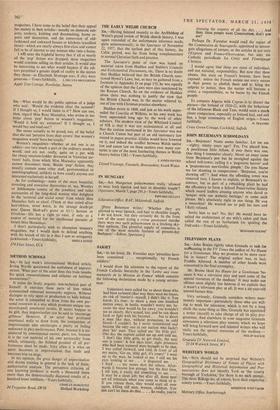SIR,—In last week's informational Method article, Irving Wardle questioned the
usefulness of improvi- sation. 'What part of the actor does this train besides his quick resourcefulness and reliance on habitual mannerisms'!'
It trains the lively, organic, non-technical part of himself. It exercises those parts of him which systematised rehearsal necessarily neglects. Without dialogue to rely upon or production to hide behind, the actor is compelled to draw from his own per- sonal resources in a way which promotes unique (un- stereotyped) emotional results. If actors happen to be glib, then improvisation can be said to 'encourage glibness.' However, if an actor has profound emotional wells to draw from, the compulsion of improvisation also encourages a purity of feeling unknown in play-performance. Pure, because it is un- cluttered by conventional assists; pure, too, because it is the raw material of his own personality from which, ultimately, the finished product of all per- formance must be made. Very often it is what an actor discovers in improvisation that feeds and succours him on stage.
In my opinion, the great danger of improvisation and drama training in general is the lack of finite, authoritative analysis. The perceptive criticism of one knowing producer is worth a thousand times more than the democratically discussed results of a hundred lesser intellects.—Yours faithfully, CHARLES MAROWITZ CHARLES MAROWITZ
24 Tregunter Road, SW 10 Method Workshop


































 Previous page
Previous page